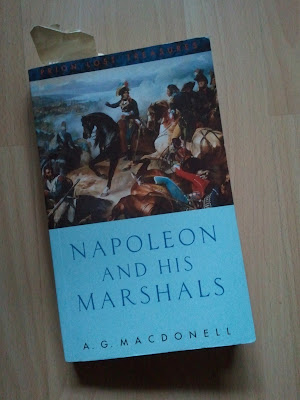We follow the story of
Macdonell makes two more exceptions from the description of military campaigns. The first is the story of the coup of Brumaire1799 and the second of the failed 1804 coup against Napoleon and his creation of the marshalate. To Macdonell these events were closely related.
The French revolutionary army was highly politicised, and republican and Jacobin factions competed with those that put more emphasis on return to order. This power struggle was behind the coups, and Napoleon’s creation of the marshalate was an attempt to reconcile those factions and bind them to his regime. The 1804 coup provided him with the opportunity to found a monarchy and dynasty but also removed credible alternatives for the opposition to rally around, like Moreau and Bernadotte.
In that way the list of marshals reflects Napoleon’s desire: old revolutionary heroes like Kellermann and Sérurier, Jacobins from the Army of the Rhine like Jourdan and Augereau, and his own supporters from Egypt (Davout), Italy
As a whole the marshals performed their task loyally and dutifully, but their loyalty was to Napoleon, or France Russia
 |
| Year of birth of the marshals, most were older than Napoleon |
But to Macdonell, that lack of moderation was not what brought down the Empire. He paints the decline after 1807 in gloomy colours as talented young commanders like Lasalle, Montbrun and Lannes die fighting for it. The opposition to Napoleon’s attack on
By 1813, the lust for glory and belief in the genius of the chief was no longer driving the marshals, but rather duty and loyalty. And in the end their lack of faith in the military and political judgement of the emperor led to his downfall a year later.
Even some of his oldest friends, like Marmont, switched their allegiance to the Bourbons. Others watched from the fence as he returned from Elba, professing their allegiance to France command at Waterloo
With so few loyal supporters left, Napoleon was forced to place his best commanders, Davout and Soult, in Paris
A lesser book would have spent more pages on Napoleon, but Macdonell resists that temptation and focuses on the motivations and interrelations of the marshals. Their many feuds and occasional friendships. Of course, there is more to say about the marshalate as the apex of a new military aristocracy, and its diplomatic and political role. A present day researcher might take a more systematic approach to this subject.
Then again, this book was written eighty years ago and it shows in many other ways. For example when Macdonell reassures us that although there is no bibliography, the reader should trust that every detail is backed up by a source. But it is hard to find a better book to read by the fireside and imagine yourself just for a second next to Ney as he guards the rear of the Grande Armée, musket in hand, against the swarming cossacks in the cold and snow.

No comments:
Post a Comment
I appreciate comments. Let me know what you think!